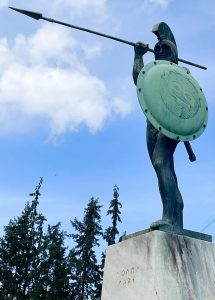
A story that has been told a thousand times and will continue.
Xerxes had spent years planning his invasion of Greece. It was to be his ‘divine punishment’ for his father Darius’ crushing defeat at Marathon in 490 BC. Now, a decade later, he had spared no expense in preparing a vast expeditionary force.By the spring of 480 Xerxes’ army had reached Macedonia in the north of Greece. In response a contingent of 300 Spartans and several thousand allies were sent to occupy the narrow mountain pass of Thermopylae, not far from the Greek fleet that was anchored off the nearby coast at Artemisium.
It was a suicide mission, designed to detain the Persians just long enough for the rest of the Greek allies to gather their forces. Led by King Leonidas, the Spartans heroically held the Persians at bay for nearly a week until – outnumbered, betrayed and outflanked – they were finally defeated.
The Spartan sacrifice at Thermopylae was not in vain. In 479 BC Greece was at last free from the threat of eastern domination. After the war, a plaque was erected to commemorate the stand of Leonidas and his men with the inscription –
“ Ὦ ξεῖν’, ἀγγέλλειν Λακεδαιμονίοις ὅτι τῇδε κείμεθα, τοῖς κείνων ῥήμασι πειθόμενοι”, which means: “Stranger, tell Spartans that we lay here, staying faithful to Sparta’s laws.”
Molon Labe-Ancient Greek for “come and take them,” monument of Leonidas Thermopylae central Greece
Thermopylae central Greece
Heroic though it was, the stand at Thermopylae was only a holding action to allow the Peloponnesians to fortify the Isthmus at Corinth and the Athenians to complete the evacuation of the city. Once Thermopylae was overrun the allied Greek fleet withdrew to the bay of Salamis. The Corinthians wanted to withdraw to south of the Isthmus and mocked the now city-less Athenians led by Themistocles. He tricked the Persians into committing their attack on the Greek fleet in the narrows of the Bay of Salamis before the Greeks could disperse. It is suggested that the Corintho-Athenian spat was a put up job to fool the Persians’ spies that the Greeks were disunited and therefore easy pickings.
The result of the Battle of Salamis was that the Persian fleet composed mainly of Phoenicians, Ionian Greeks and Egyptians lost control of the Aegean Sea. (The Greeks of Sicily and Italy were under a coordinated attack from the Phoenician-Carthaginians and won the Battle of Himera, purportedly on the same day as the Battle of Salamis)
Xerxes scuttled back over the Hellespont bridge to Asia Minor leaving a much reduced Persian army under Mardonius. It was defeated the following year by the allied Greek army led by Pausanias, Leonidas’ nephew, at Plataea. After the battle, so the story goes, he took the allied generals to Mardonius’ tent. He pointed to the lavish Persian food and then at the Spartans’ standard ration of porridge saying “They came to rob us of of this!”
